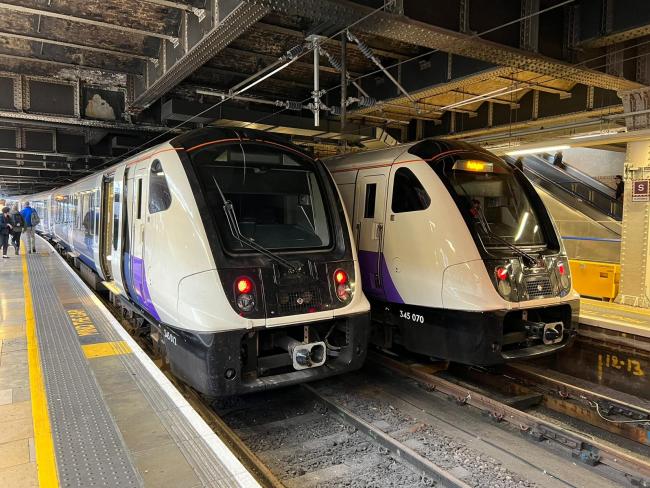9 April 2024

Elizabeth Line Class 345 Aventura trains, built at Derby works. Photo Workers.
Britain’s railways continue to see sustained, strong passenger growth. That’s despite the government’s best efforts to choke off demand.
The government may have retreated on closing ticket offices, but it is increasing fares and massively cutting back on investment, as well as provoking unions into taking regular industrial action.
Undermined
And the latest blow to the rail industry is the threat of closure and redundancy at Alstom Derby. The lack of government commitment to rail travel and future investment has undermined Britain’s capacity for train manufacturing and servicing and ultimately threatens the future of the network.
The latest figures show that both passenger numbers and revenue are up by around 20 per cent for the period October to December 2023 compared with the same period in 2022. This is the eleventh consecutive quarterly increase. Rail freight – as measured by net tonne kilometres – is also up, by 4 per cent.
Success
The success of the Elizabeth line exemplifies the popularity of investment in new railways. Critics trying to play down the increase in rail travel point to the opening of the Elizabeth Line in the London area. Now classed as part of the national rail network, it has inflated the numbers with a 40 per cent increase to 58 million passengers. But that is not a reason to question the underlying growth.
‘People want to travel by rail.’
An increase in split-ticketing, buying two tickets for a single trip, has also skewed the numbers to a limited extent. It’s a popular way for passengers to reduce the cost of a trip faced with exorbitant fares. Again this shows that people want to travel by rail.
There is no doubt that there is significant growth in passenger rail travel across the country. ScotRail figures were up by 34 per cent, West Midlands by 20 per cent, and Transport for Wales by 19 per cent. And notably CrossCountry, despite widespread overcrowding problems, was up 26 per cent.
Capacity needed
Passenger numbers are now at the levels of 2015-16, with no sign of growth slowing. Even before then successive governments had realised that significant additional capacity was required to cope with rising numbers. And as a result the construction of HS2 was begun.
But the HS2 project has now been cut back so much that it is now in doubt whether it can provide any real additional capacity. That’s a risk especially if the section from Old Oak Common in west London to Euston in central London is not built.
Withheld
Because of the government’s lack of enthusiasm for railways, the future of Alstom in Derby – Britain’s largest train builder – now looks bleak. Government has continued to withhold authority to build much-needed new trains, running down the order book.
‘The industry needs long term planning and commitment.’
Industries like this cannot be just switched on and off. Long term planning and commitment is required. Unite the Union and others in the industry have repeatedly pointed this out, only last September calling for orders to be brought forward to avoid closures.
But that’s exactly what has happened. And now thousands of workers in Alstom and in the supply chain face redundancy. And any future procurement of new trains will have to be from foreign factories – with designs not optimised for British conditions.
Expertise
The factory at Derby goes back to the origins of the rail industry in Britain, over 150 years ago. It has the capacity to produce the modern trains Britain needs. But once closed, the loss of expertise and experience cannot easily be replaced, if at all.
Hitachi, which has a train building factory in County Durham at Newton Aycliffe, has also warned of redundancies for similar reasons. Unite is campaigning vigorously to save the many skilled jobs at these plants that depend on early decisions on investment in new trains.
• There’s slightly better news with building tube trains. Siemens announced in February that it is opening a new train factory in Goole, East Riding of Yorkshire. This is for new Piccadilly Line trains ordered by Transport for London. Although this plant is for the assembly of trains designed and built elsewhere, it will support jobs in the area and a local supply chain.
